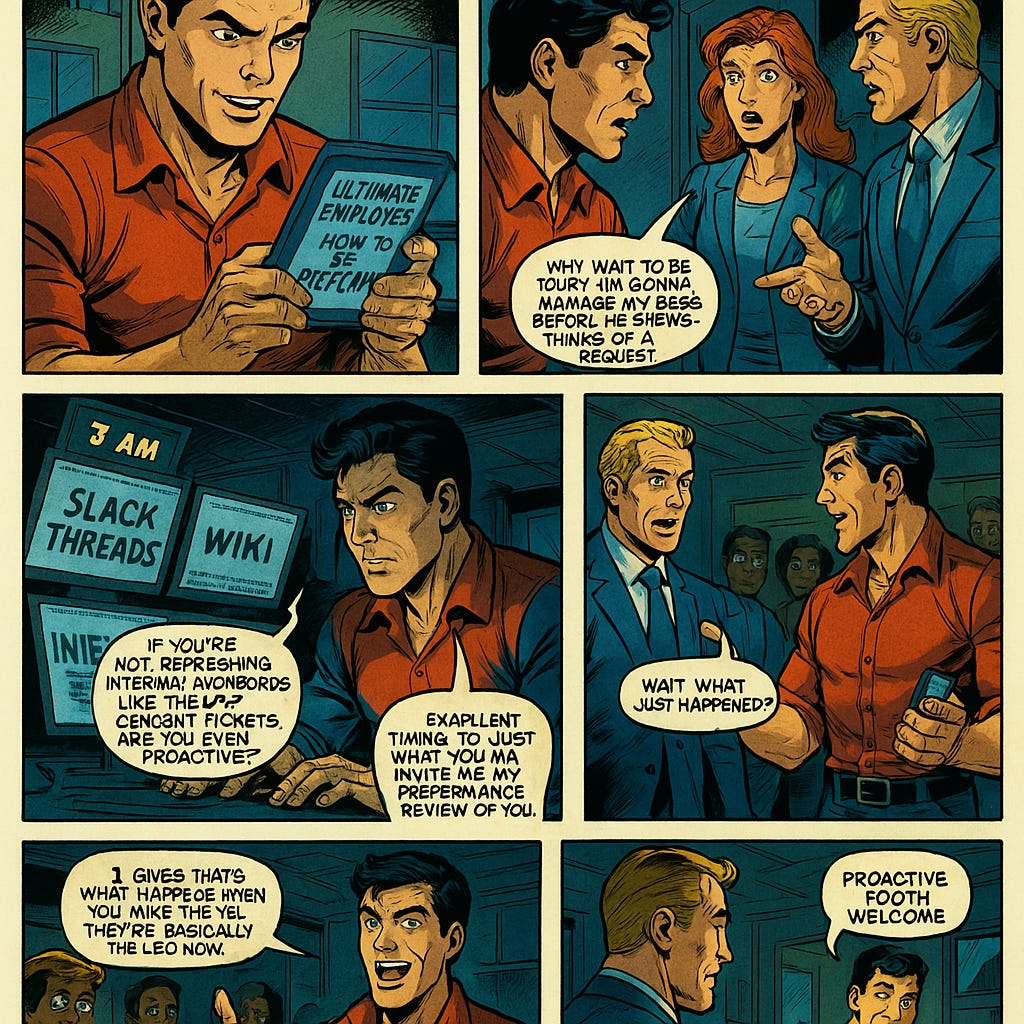ultimate employee: the one that is truly proactive
“who needs permission? I just submitted a new product roadmap, adopted half of HR’s backlog, and told Finance we’re pivoting to crypto.”
ultimate employee: the one that is truly proactive
only 1% of employees are truly proactive.
but these are the very best people.
if you are wondering if you are really proactive, here is a simple test:
do you manage your boss or does your boss manage you?
when you think of important things for the company to do: do you do get them done or do you suggest that they get done?
are you constantly crawling internal message boards and internal databases to learn more about the company or are you waiting for information to be sent to you?
when you miss deadlines: do you tell everyone about it ahead of time or do people sometimes tell you?
do you actively find ways to improve processes, or do you simply complete tasks as assigned?
do you default to “Yes, And” or “No, but”?
are you constantly asking people in the org to move faster OR does anyone in the org ever ask you to move faster?
do you take ownership of company-wide problems or do you assume they belong to someone else?
are you opportunity-oriented or loss-avoiding?
are you anticipating what leadership will ask for next or are you reacting to their requests?
more:
the truly proactive crawl all the internal info about the company and find ways to make it better. they manage their boss -- their boss never manages them.
they push initiatives forward without waiting for permission and own problems as if they were the CEO.
they think beyond their role and contribute to long-term company success.
they spot patterns in company operations and prevent issues before they arise.
they take responsibility for results, not just effort
“Wait, you're telling me normal employees don’t comb through every company Slack thread at 3AM to sniff out synergy? Sorry, can’t relate. I'm too busy generating next quarter’s pivot strategy.”
“Are you even a ‘proactive 1%er’ if you haven’t hijacked the company roadmap by Q2?”
“My boss tried to schedule a performance review—so I sent him a Google Calendar invite to my performance review of him”
“Pro tip: If you’re not scouring your internal wiki like it’s Reddit at 2AM, you’ll never spot that next big pivot before your boss does.”
“Missed a deadline? If you’re truly proactive, you called it two weeks ago, posted a Gantt chart of fixes, and already moved on to the next project.”
“Who needs permission? I just submitted a new product roadmap, adopted half of HR’s backlog, and told Finance we’re pivoting to crypto.”
“Heads up: If you miss a deadline and someone else has to tell you, you might as well rename yourself ‘Reactive Randy.’”
X of the week:
if you like this article, please do three things:
share it with someone you admire
follow me (@auren) on X
subscribe to the “World of DaaS” podcast
(if you hate this, please share with all your enemies)






I can't tell if I love or hate this. Proactivity is such a wonderful trait. Perceiving a need, acting upon it intelligently, knowing when to take charge and when to surface a problem to the current owner; all of these can dramatically improve the performance of a company.
On the flip side: repeatedly swooping in to drop a fast but mediocre solution to a problem already being solved better but slower (and thus stop the better solution in its tracks) can kill a company's long-term power. Duplicating efforts in uncoordinated ways can waste resources and kill morale.
How can an organization best enable everyone to be proactive, thoughtful, and aligned?
Or is that a false utopia, and the only realistic way is hire enough proactive folks and let them duke it out?
I prefer the concept of “high agency” because proactivity is only part of what makes people highly effective and impactful. https://www.highagency.com/